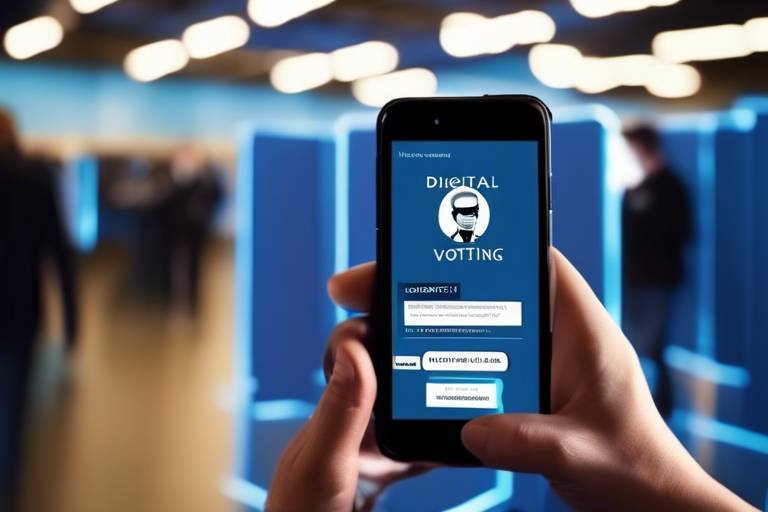How to Start Your Own Blockchain-Based Startup
Starting your own blockchain-based startup can feel like embarking on an exhilarating journey into uncharted waters. With the rapid evolution of technology, the potential for innovation is immense, yet so are the challenges. In this guide, we will explore the essential steps and considerations necessary for launching a successful blockchain startup. From understanding the technology to navigating legal challenges, we will cover everything you need to know to turn your vision into reality.
Before diving headfirst into the world of blockchain, it’s crucial to have a solid understanding of what blockchain technology is all about. At its core, blockchain is a decentralized ledger that records transactions across many computers. This means that once a transaction is recorded, it cannot be altered retroactively without the alteration of all subsequent blocks and the consensus of the network. Imagine it as a digital notebook that everyone can see but no one can erase. There are various types of blockchains, including public, private, and consortium blockchains, each serving different purposes and industries. Understanding these principles will not only help you in developing your product but also in communicating its value to potential investors and users.
Identifying the right market niche is like finding a needle in a haystack, but once you do, it can lead to incredible opportunities. Start by analyzing current market needs and trends. What problems are businesses facing that blockchain can solve? For instance, industries like supply chain management, healthcare, and finance are ripe for disruption. Utilize tools like SWOT analysis (Strengths, Weaknesses, Opportunities, Threats) to evaluate potential areas where blockchain can add significant value. Engaging with your target audience through surveys or focus groups can also provide insights into their pain points. Remember, the goal is to find a unique angle that sets your startup apart from the competition.
Your startup is only as strong as the team behind it. Building a competent team is essential for executing your vision effectively. Look for individuals who not only possess technical skills but also share your passion for blockchain technology. This includes developers, marketers, and business strategists who can help navigate the complexities of the startup landscape. Fostering a collaborative environment where ideas can flow freely is key. Encourage open communication and creativity, as this will lead to innovative solutions that can propel your startup forward.
Creating a viable business model is crucial for the sustainability of your blockchain startup. There are several models to consider, such as transaction fees, subscription services, or token sales. Each model has its own set of advantages and challenges. For instance, a transaction fee model may be suitable for a platform facilitating peer-to-peer transactions, while a subscription model might work better for a service offering ongoing value. It’s essential to choose a model that aligns with your target market and the specific problems your startup aims to solve. Conduct thorough market research to validate your model before moving forward.
Funding can often be a major hurdle for startups, especially in the blockchain space where investors may be cautious. However, there are various options available, including venture capital, crowdfunding, and grants. Each funding source comes with its own set of requirements and expectations. For instance, venture capitalists may seek a quick return on investment, while crowdfunding allows you to gauge market interest before fully committing. Explore all avenues and consider creating a compelling pitch deck that highlights your unique value proposition and market potential to attract potential investors.
Blockchain startups face unique legal challenges, making compliance a top priority. Regulations can vary significantly from one jurisdiction to another, so it’s essential to stay informed about the legal landscape in your target market. Engaging with legal experts who specialize in blockchain can help you navigate these complexities. Ensure that your startup adheres to relevant laws, including data privacy regulations and securities laws, to avoid potential pitfalls down the road. Remember, a strong foundation in compliance not only protects your startup but also builds trust with your users and investors.
Developing a Minimum Viable Product (MVP) is a strategic way to validate your idea with minimal resources. An MVP allows you to test your concept in the market and gather valuable feedback from early users. Start by identifying the core features that solve your target audience's problems. Once you have a prototype, launch it to a select group of users and observe their interactions. Use their feedback to iterate and improve your product before a full-scale launch. This approach not only saves time and resources but also increases your chances of success.
Effective marketing strategies are essential for gaining visibility in a crowded market. Start by developing a strong online presence through content marketing, social media, and search engine optimization (SEO). Educational content that explains the benefits of your blockchain solution can attract potential users and investors. Consider hosting webinars or workshops to showcase your expertise and engage with your audience. Collaborating with influencers in the blockchain space can also amplify your reach and credibility. Remember, the goal is to create a buzz around your startup and position it as a leader in the industry.
Once your startup is established, scaling becomes the next big challenge. This involves expanding your user base, enhancing your technology, and possibly entering new markets. Consider forming strategic partnerships with other companies to leverage their resources and networks. Technology upgrades may also be necessary to accommodate growth, so stay ahead of the curve by continually innovating. Market expansion can open new revenue streams, but it’s essential to conduct thorough market research to ensure a successful entry. Scaling is not just about growth; it’s about sustainable growth that aligns with your long-term vision.
- What is blockchain technology? Blockchain is a decentralized digital ledger that records transactions across multiple computers, ensuring security and transparency.
- How do I choose a market niche for my blockchain startup? Analyze current market needs, conduct surveys, and use tools like SWOT analysis to identify where blockchain can add value.
- What are the best funding options for blockchain startups? Consider venture capital, crowdfunding, and grants, each with its own benefits and challenges.
- How do I navigate legal challenges in the blockchain space? Stay informed about regulations in your jurisdiction and consult with legal experts specializing in blockchain.
- What is a Minimum Viable Product (MVP)? An MVP is a simplified version of your product that allows you to test your concept in the market and gather user feedback.

Understanding Blockchain Technology
To truly grasp the potential of a blockchain-based startup, it's essential to have a solid understanding of blockchain technology. At its core, blockchain is a decentralized digital ledger that records transactions across multiple computers. This ensures that the recorded transactions cannot be altered retroactively without the alteration of all subsequent blocks, which makes it incredibly secure. Imagine a public library where every book is a block of data, and each time a new book is added, it must be placed in a specific order. This way, everyone can see the new addition, but no one can change the existing books without everyone noticing.
There are several types of blockchains, each serving different purposes:
- Public Blockchains: Open to anyone; think Bitcoin or Ethereum.
- Private Blockchains: Restricted access; used by organizations for internal purposes.
- Consortium Blockchains: Controlled by a group of organizations; often used in business collaborations.
Blockchain technology can revolutionize various industries by enhancing transparency, reducing fraud, and improving efficiency. For instance, in the supply chain industry, blockchain can track the journey of a product from its origin to the consumer, ensuring authenticity and reducing the chances of counterfeit goods. Similarly, in finance, it can streamline processes by enabling faster and cheaper transactions without the need for intermediaries.
Moreover, the smart contracts feature of blockchain is a game changer. These are self-executing contracts with the terms of the agreement directly written into code. Think of it as a vending machine: you insert money, select your item, and the machine automatically delivers it without needing a salesperson. This automation can significantly reduce costs and increase trust between parties.
As you embark on your blockchain startup journey, understanding these fundamental principles will not only help you navigate the technology but also position you to leverage its capabilities effectively. Whether you're looking to disrupt traditional industries or create entirely new markets, the potential of blockchain is vast and largely untapped.

Identifying Market Opportunities
Identifying the right market opportunities is like finding a hidden treasure chest in a vast ocean. You need to dive deep, explore, and understand the currents before you can claim your prize. In the world of blockchain, where innovation is the name of the game, knowing where to focus your efforts can set you apart from the competition. So, how do you pinpoint these golden opportunities? Let’s break it down!
First and foremost, conducting thorough market research is essential. This involves analyzing existing solutions, understanding consumer pain points, and recognizing gaps in the market that blockchain can fill. By leveraging tools such as surveys, interviews, and data analytics, you can gather insights that reveal what potential customers are truly seeking. For instance, if you discover that users are frustrated with the slow transaction speeds of traditional banking systems, you might consider developing a blockchain-based payment solution that offers faster processing times.
Next, it’s crucial to keep an eye on emerging trends. The blockchain landscape is constantly evolving, with new technologies and applications emerging every day. By staying informed about the latest developments—such as decentralized finance (DeFi), non-fungible tokens (NFTs), and supply chain transparency—you can identify areas where your startup could make a significant impact. For example, if you notice a growing interest in NFTs for digital art, you might explore creating a platform that facilitates the buying and selling of these unique assets.
Another effective strategy is to immerse yourself in the blockchain community. Engaging with industry forums, attending conferences, and participating in online discussions can provide invaluable insights into what the market needs. Networking with other entrepreneurs and experts can also spark ideas that lead to innovative solutions. Remember, sometimes the best opportunities come from simply listening to what others are saying!
Moreover, consider the regulatory landscape as you assess market opportunities. Different regions have varying regulations regarding blockchain and cryptocurrencies, which can significantly influence the viability of your startup. For instance, some countries are more welcoming to blockchain innovations, while others may impose strict regulations that could hinder growth. By understanding these legal frameworks, you can identify markets that are ripe for disruption.
Finally, don’t underestimate the power of customer feedback. Once you have a prototype or minimum viable product (MVP), engaging with your target audience can provide insights that help refine your offering. Conducting user testing, gathering opinions, and iterating based on feedback can lead you to uncover opportunities that you may not have initially considered.
In summary, identifying market opportunities in the blockchain space requires a multi-faceted approach. By conducting thorough research, staying updated on trends, engaging with the community, understanding regulations, and valuing customer feedback, you can uncover the hidden gems that will propel your startup to success. Remember, the key is to remain adaptable and open-minded—after all, the blockchain world is full of surprises!
- What is the best way to conduct market research for a blockchain startup?
Utilize surveys, interviews, and data analytics to gather insights about consumer needs and market gaps.
- How can I stay updated on blockchain trends?
Follow industry news, join blockchain forums, and participate in conferences to keep abreast of the latest developments.
- Why is customer feedback important?
Customer feedback helps refine your product and can reveal additional market opportunities you might not have considered.

Building a Strong Team
When it comes to launching a blockchain startup, one of the most critical factors for success is the team you assemble. Think of your team as the engine of a high-performance car; without the right components working in harmony, you simply won't reach your destination. Building a strong team involves more than just hiring skilled professionals; it requires a deep understanding of the unique challenges and opportunities that blockchain technology presents.
First and foremost, you need to identify the key roles that will drive your startup forward. This typically includes developers who are proficient in blockchain programming languages such as Solidity or Rust, as well as professionals with expertise in cryptography, smart contracts, and decentralized applications. Additionally, having a strong marketing and business development team is essential to ensure your product reaches the right audience and scales effectively. Don’t forget the importance of legal and compliance experts who can navigate the complex regulatory landscape surrounding blockchain.
However, it’s not just about filling positions; it’s about finding individuals who share your vision and passion for innovation. Look for team members who are not only skilled but also adaptable and willing to learn. The blockchain space is constantly evolving, and having a team that can pivot and embrace change is invaluable. A collaborative environment fosters creativity and encourages team members to share their ideas freely, which can lead to groundbreaking solutions.
Moreover, consider the **diversity** of your team. A mix of backgrounds, experiences, and perspectives can significantly enhance problem-solving and creativity. In fact, research shows that diverse teams outperform their homogenous counterparts, bringing varied viewpoints that can lead to more innovative solutions. So, as you build your team, aim for a blend of technical expertise, business acumen, and diverse perspectives.
To facilitate a strong team dynamic, establish a culture of open communication. Encourage team members to voice their opinions, share their concerns, and provide feedback. Regular team meetings and brainstorming sessions can help maintain this culture, ensuring everyone feels valued and engaged. Consider implementing tools and platforms that promote collaboration, such as project management software or communication apps, to keep everyone on the same page.
Finally, investing in your team’s growth is crucial. Offer opportunities for professional development through workshops, online courses, or industry conferences. This not only enhances their skills but also demonstrates your commitment to their success, fostering loyalty and motivation. Remember, a well-supported team is a happy team, and happy teams produce great results.
In summary, building a strong team for your blockchain startup is about more than just hiring the right people; it’s about creating an environment where innovation can thrive. By focusing on collaboration, diversity, and continuous learning, you can assemble a powerhouse team that will help propel your startup to new heights.
- What skills should I look for when building a blockchain team? Look for skills in blockchain development, cryptography, smart contracts, and business development. Adaptability and a willingness to learn are also crucial.
- How important is team diversity in a blockchain startup? Diversity is extremely important as it enhances creativity and problem-solving, leading to more innovative solutions.
- What can I do to foster a positive team culture? Encourage open communication, provide opportunities for professional development, and implement collaborative tools to keep team members engaged.

Developing a Business Model
Creating a viable business model is absolutely crucial for the sustainability of your blockchain startup. Without a solid foundation, your innovative idea might struggle to gain traction in a competitive market. Think of your business model as the blueprint of your startup; it outlines how you plan to create, deliver, and capture value. So, how do you go about crafting this essential component? Let's break it down.
First and foremost, you need to understand the core value proposition of your product or service. What makes it unique? Why would someone choose your blockchain solution over traditional options? This is where you need to dive deep into the specifics of your offering. For instance, if you're developing a decentralized finance (DeFi) application, your value proposition might center around lower transaction fees and increased transparency. On the other hand, if you're creating a supply chain solution, your focus could be on enhanced traceability and efficiency.
Next, consider the different types of business models that are particularly well-suited for blockchain startups. Here are a few popular ones:
- Transaction Fees: Charge users a fee for each transaction processed on your platform.
- Subscription Model: Offer premium features or services for a recurring fee.
- Token Sales: Sell tokens that provide access to your platform or services.
- Freemium Model: Provide basic services for free while charging for advanced features.
Choosing the right model is not just about what sounds good; it should align with your target market's needs and behaviors. Conducting thorough market research can help you identify which model resonates best with your potential users. You might even find that a hybrid approach works best, combining elements from multiple models to maximize revenue streams.
Additionally, it's essential to think about scalability. Your business model should not only work for your initial launch but also be adaptable as your startup grows. Consider how you can expand your offerings or tap into new markets without overhauling your entire approach. For example, if your initial focus is on a specific industry, think about how your technology could be applied in other sectors down the line.
Another critical aspect is the revenue generation strategy. You need to have a clear understanding of your costs and how you plan to cover them. This includes everything from operational expenses to marketing costs. A well-structured financial plan will not only help you stay on track but also attract potential investors. They want to see that you have a clear path to profitability.
Finally, don’t forget about the importance of feedback. Once you have a draft of your business model, share it with trusted advisors, mentors, or even potential customers. Their insights can provide invaluable perspectives that you might have overlooked. Remember, the best business models are often iterative; they evolve based on real-world feedback and changing market conditions.
In conclusion, developing a robust business model is a multi-faceted process that requires careful consideration of various elements. By focusing on your value proposition, selecting the right model, ensuring scalability, and maintaining a clear revenue strategy, you can set your blockchain startup on a path to success.
- What is a business model? A business model outlines how a company creates, delivers, and captures value, detailing the strategy for generating revenue.
- Why is a business model important for blockchain startups? A well-defined business model helps to clarify your value proposition, attract investors, and ensure long-term sustainability.
- Can I change my business model after launching? Yes, many successful startups iterate on their business models based on market feedback and changing conditions.

Securing Funding
Securing funding for your blockchain startup can often feel like trying to catch smoke with your bare hands. It's tricky, but with the right approach, you can definitely make it happen! First off, you need to understand that funding is not just about getting money; it's about finding the right partners who believe in your vision. Whether you're bootstrapping, seeking venture capital, or exploring crowdfunding, each option has its unique set of pros and cons.
Let’s dive into some common funding avenues:
- Venture Capital: This is a popular choice for many startups. Venture capitalists are usually looking for high-growth potential and a solid business model. They bring not just money, but also valuable mentorship and connections.
- Crowdfunding: Platforms like Kickstarter or Indiegogo allow you to present your idea to the public and raise funds directly from interested individuals. It’s a great way to validate your concept and build a community around your brand.
- Grants: Various organizations and governments offer grants for innovative tech solutions, especially in the blockchain space. These funds don’t need to be paid back, but the application process can be competitive and rigorous.
Now, before you start knocking on doors, it’s crucial to prepare a compelling pitch. Your pitch should not just explain what your startup does, but also highlight the problem it solves and the market opportunity it addresses. Think of it as telling a story where you are the hero on a quest to solve a pressing issue. A well-crafted pitch deck can make all the difference. Here are some key elements to include:
| Slide | Content |
|---|---|
| 1 | Introduction to your startup and its mission |
| 2 | The problem you are addressing |
| 3 | Your unique solution |
| 4 | Market analysis and potential |
| 5 | Business model overview |
| 6 | Funding requirements and use of funds |
Don’t forget to practice your pitch! You want to be able to deliver it confidently and passionately. Investors are not just investing in your idea; they are investing in you. Show them your enthusiasm and commitment to making your startup a success.
Lastly, be prepared for due diligence. Investors will want to dig deep into your business model, financial projections, and even your team’s background. Having all your documentation in order can save you a lot of time and headaches.
In summary, securing funding for your blockchain startup is a multifaceted process that requires preparation, clarity, and confidence. By understanding your options and crafting a compelling narrative, you can attract the right partners and resources to fuel your vision.
Q1: What is the best funding option for a blockchain startup?
A1: There is no one-size-fits-all answer. It depends on your specific needs, business model, and growth potential. Venture capital is great for high-growth startups, while crowdfunding can help validate your idea.
Q2: How do I create a compelling pitch?
A2: Focus on telling a story that highlights the problem you’re solving, your unique solution, and the market opportunity. Use visuals and keep it concise to maintain interest.
Q3: What documents do I need for due diligence?
A3: Be prepared with your business plan, financial projections, legal documents, and information about your team. Having everything organized will make the process smoother.

Navigating Legal and Regulatory Challenges
Launching a blockchain startup is an exciting venture, but it comes with its own set of legal and regulatory challenges that can feel like a maze. Imagine stepping into a labyrinth where every turn presents a new obstacle; that’s the reality for many entrepreneurs in the blockchain space. Understanding the legal landscape is not just advisable; it’s essential for the survival and success of your startup. So, how can you effectively navigate these challenges?
First and foremost, it’s crucial to recognize that blockchain technology operates in a rapidly evolving environment. Laws and regulations are still being formulated, which means what’s compliant today might not be tomorrow. This uncertainty can create a sense of anxiety for founders, but it can also present opportunities for innovation. By staying informed and adaptable, you can position your startup to thrive amidst change.
One of the primary legal concerns is the classification of cryptocurrencies and tokens. Are they considered securities? Utility tokens? The answer can significantly impact your compliance obligations. For instance, if your token is classified as a security, it may be subject to stringent regulations, requiring registration with regulatory bodies such as the SEC in the United States. To clarify this, many startups engage legal experts who specialize in blockchain law to help navigate these murky waters.
Additionally, regulatory frameworks vary significantly from one jurisdiction to another. For example, countries like Switzerland and Malta have established favorable environments for blockchain startups, while others may impose strict regulations or outright bans. Therefore, it’s vital to conduct thorough research on the legal requirements in your target market. This could involve:
- Reviewing local laws and regulations regarding cryptocurrency and blockchain technology.
- Consulting with legal professionals who understand the nuances of blockchain law.
- Engaging with local blockchain communities to gain insights into regulatory challenges.
Another key aspect to consider is data privacy and protection. With the advent of regulations like the General Data Protection Regulation (GDPR) in Europe, startups must ensure that they are compliant with data handling and privacy laws. This is particularly important if your blockchain application involves the processing of personal data. Non-compliance can lead to hefty fines and damage to your reputation, so it’s crucial to implement robust data protection measures from the outset.
Moreover, intellectual property (IP) rights are another area where blockchain startups often face challenges. Protecting your innovative ideas and technology is critical, and this can involve filing for patents or trademarks. However, the decentralized nature of blockchain can complicate IP rights, making it essential to seek legal guidance on how best to protect your assets.
In summary, navigating the legal and regulatory landscape of a blockchain startup requires diligence, adaptability, and expert advice. By understanding the implications of your technology, staying informed about regulatory changes, and consulting with legal professionals, you can mitigate risks and set your startup on a path to success.
- What are the main legal challenges faced by blockchain startups? Blockchain startups often face challenges related to token classification, data privacy laws, and intellectual property rights.
- How can I ensure compliance with regulations? Engage with legal experts who specialize in blockchain law, conduct thorough research on local regulations, and stay updated on changes in the legal landscape.
- Why is it important to protect my intellectual property? Protecting your IP ensures that your innovations are safeguarded from infringement and can enhance your startup's value.
- What role does jurisdiction play in regulatory compliance? Different jurisdictions have varying regulations regarding blockchain technology; understanding these differences is crucial for compliance.

Creating a Minimum Viable Product (MVP)
When it comes to launching your blockchain startup, one of the most critical steps is creating a Minimum Viable Product (MVP). Think of the MVP as the first taste of your innovative solution—a way to showcase your concept to potential users and investors without pouring all your resources into a fully developed product. But what exactly does this entail? Let’s dive into the essentials of crafting an MVP that not only resonates with your audience but also lays the groundwork for future enhancements.
First and foremost, an MVP should focus on solving a specific problem. It's like finding the perfect key for a lock; you want to ensure that your product unlocks a genuine need in the market. Start by identifying the core features that directly address this problem. You might be tempted to include all the bells and whistles, but remember, simplicity is key. A laser-focused MVP allows you to gather meaningful feedback without overwhelming users with unnecessary complexity.
To get started, consider the following steps:
- Research and Validate Your Idea: Before you even sketch out your MVP, conduct thorough market research. Engage with potential users through surveys or interviews to validate your concept. This feedback will be invaluable in shaping your product.
- Define Your Core Features: List out the essential features that will make your MVP functional. Prioritize these features based on user needs and the problem you aim to solve. Think of it as packing for a trip; you only want to bring what’s absolutely necessary.
- Choose the Right Technology: Selecting the appropriate technology stack is crucial for your MVP. Consider factors such as scalability, security, and ease of development. For blockchain startups, this often means choosing the right blockchain platform that aligns with your goals.
- Develop and Test: Once you have your features and technology in place, it’s time to start building! Focus on creating a functional prototype that you can test with real users. This phase is all about iteration; be prepared to refine your product based on user feedback.
After launching your MVP, don’t just sit back and relax. Engage with your users actively. Collect data on how they interact with your product, and encourage them to provide feedback. This engagement is your golden opportunity to understand what works and what doesn’t. Remember, the goal here is to learn and adapt. Use this feedback to iterate on your MVP, adding features that enhance user experience and removing those that don't resonate.
Finally, keep in mind that creating an MVP is not a one-time event; it’s an ongoing process. As you gather insights and data, continuously improve your product to better meet the needs of your users. This iterative approach not only helps in refining your product but also builds a loyal customer base that feels valued and heard.
In conclusion, launching a successful MVP can set the stage for your blockchain startup's future. It allows you to test your ideas in the real world, gather critical feedback, and make informed decisions moving forward. So, roll up your sleeves, and get ready to create a product that not only meets market needs but also excites your audience!
Q1: What is the primary purpose of an MVP?
A1: The primary purpose of an MVP is to test your product concept in the market with minimal resources while gathering valuable feedback from users.
Q2: How do I determine the core features for my MVP?
A2: Identify the main problem your product addresses and list the essential features that directly contribute to solving that problem. Prioritize these features based on user needs.
Q3: Is an MVP only for startups?
A3: While MVPs are commonly associated with startups, established companies can also use them to test new ideas or features before full-scale development.

Marketing Your Blockchain Startup
When it comes to launching your blockchain startup, having a killer product is just the beginning. Think of marketing as the megaphone that amplifies your voice in a crowded marketplace. You need a strategy that not only captures attention but also builds trust and engages your target audience. So, how do you effectively market your blockchain startup? Let's dive into some essential tactics!
First off, you need to define your target audience. Who are the people that will benefit from your product? Are they tech-savvy millennials, traditional businesses looking to innovate, or perhaps investors seeking the next big thing? Understanding your audience is crucial. Once you know who you're talking to, you can tailor your message to resonate with them. It’s like crafting a love letter; you wouldn’t write it the same way for your grandma as you would for your partner, right?
Next, consider leveraging content marketing. This approach allows you to establish your authority in the blockchain space. Create valuable content such as blog posts, whitepapers, and case studies that educate your audience about blockchain technology and its benefits. By providing useful information, you position yourself as a thought leader. Remember, people are more likely to trust a brand that offers insights and solutions rather than just a sales pitch. Think of it as planting seeds in a garden; with time and care, those seeds will grow into something beautiful.
Social media is another powerful tool in your marketing arsenal. Platforms like Twitter, LinkedIn, and Reddit are buzzing with discussions about blockchain. Engage with these communities by sharing your insights, participating in discussions, and promoting your content. You can even join or create Telegram groups where enthusiasts gather to talk about blockchain innovations. This is where you can build a loyal following and foster genuine connections. Just remember to be authentic; people can sense a phony from a mile away!
Another effective strategy is to utilize influencer marketing. Collaborating with influencers in the blockchain space can give your startup a significant boost. These individuals have established credibility and a dedicated following. By partnering with them, you can tap into their audience and gain exposure that would take ages to achieve on your own. It's like hitching a ride on a rocket ship—fast and thrilling!
Don’t forget about the power of email marketing. Building a mailing list allows you to communicate directly with interested parties. Share updates, industry news, and exclusive offers to keep your audience engaged. Personalization is key here; tailor your messages to different segments of your audience to increase engagement. Think of it as sending personalized invitations to a party rather than a generic flyer. People appreciate being recognized!
Lastly, consider hosting or participating in blockchain events and webinars. These platforms not only allow you to showcase your expertise but also provide opportunities for networking. Attending industry conferences or hosting your own webinars can put you in front of potential investors and customers. It’s like throwing a big party where everyone is invited to learn and share ideas. Just make sure you have a compelling presentation to keep them engaged!
In summary, marketing your blockchain startup requires a multi-faceted approach. From understanding your audience to leveraging content, social media, influencers, email marketing, and events, each strategy plays a vital role in your overall marketing plan. Remember, the goal is to build trust and create lasting relationships with your audience. With the right strategies in place, your startup will not only survive but thrive in the competitive blockchain landscape!
- What is the best way to reach my target audience? Understanding where your audience spends their time online and tailoring your content to those platforms is key.
- How important is content marketing for my startup? Extremely important! It helps establish authority and trust, which are crucial in the blockchain space.
- Should I invest in influencer marketing? Yes, partnering with established influencers can provide valuable exposure and credibility.
- What role does social media play? Social media is essential for engagement and building a community around your brand.

Scaling Your Startup
Once you've established your blockchain startup, the next exhilarating challenge is scaling it. Scaling is not just about growth; it's about sustainable growth that propels your business to new heights while ensuring you maintain the quality and integrity of your services. Think of scaling like planting a tree: you want it to grow tall and strong, but you also need to make sure the roots are deep enough to support that height. So, how do you achieve this balance?
First and foremost, partnerships can be a game-changer. Collaborating with other businesses can enhance your reach and resources. For instance, if you're in the fintech space, partnering with established banks can provide you with credibility and a customer base that would take years to build independently. These partnerships can also facilitate access to new technologies and markets, allowing you to innovate faster.
Next, consider technology upgrades. As your user base grows, the technology that served you well in the early days may start to show its limitations. Investing in scalable solutions, such as cloud services or improved blockchain protocols, will ensure that your infrastructure can handle increased demand without compromising performance. This is akin to upgrading from a small car to a robust truck when you need to transport more goods.
Market expansion is another critical aspect of scaling. This may involve entering new geographical regions or diversifying your product offerings. However, it's essential to conduct thorough market research before diving in. Understanding local regulations, consumer behavior, and competition can make the difference between a successful expansion and a costly mistake. For example, if you're planning to launch in a different country, consider cultural nuances that may affect how your product is received.
Moreover, don't underestimate the power of customer feedback. As you scale, staying attuned to your customers' needs and preferences is vital. Regularly engaging with your users, whether through surveys or direct communication, helps you refine your offerings and ensure that you're meeting market demands. This feedback loop can also inspire new features or services, keeping your startup relevant and competitive.
Lastly, consider your team dynamics. As you grow, it's crucial to maintain a strong company culture that fosters collaboration and innovation. Bringing in new talent is essential, but so is ensuring that your existing team feels valued and motivated. Regular team-building activities and open communication channels can help maintain morale and productivity as you scale.
In summary, scaling your blockchain startup is a multifaceted endeavor that requires strategic planning and execution. By focusing on partnerships, technology upgrades, market expansion, customer feedback, and team dynamics, you can create a robust framework for sustainable growth. Remember, every successful startup has faced the challenge of scaling, and with the right approach, you can navigate this journey effectively.
- What is the most critical factor for scaling a startup? While many factors contribute to successful scaling, having a strong team and effective partnerships are often cited as the most crucial.
- How do I know when to scale? Signs that indicate it's time to scale include consistent revenue growth, a loyal customer base, and positive feedback on your product or service.
- What are common pitfalls when scaling? Common pitfalls include overextending resources, neglecting customer feedback, and failing to maintain company culture during rapid growth.
Frequently Asked Questions
- What is blockchain technology?
Blockchain technology is a decentralized digital ledger that records transactions across many computers. This means that no single entity has control over the entire chain, making it secure and transparent. It's like having a communal notebook where everyone can see and verify the entries, but no one can erase them!
- How do I identify market opportunities for my blockchain startup?
Identifying market opportunities involves researching current trends and understanding consumer needs. You can conduct surveys, analyze competitors, and explore industries that could benefit from blockchain solutions. Think of it as being a treasure hunter; you need to know where to dig to find the gold!
- What are the key components of a strong team for a blockchain startup?
A strong team typically includes individuals with diverse skills such as software development, blockchain expertise, marketing, and business strategy. It's crucial to foster a collaborative environment where everyone feels valued. Imagine a band where each member plays a different instrument, but together they create a beautiful symphony!
- What business models are suitable for blockchain startups?
There are several business models to consider, including transaction fees, subscription services, and token sales. The choice depends on your target market and the value your product offers. It's like choosing the right recipe; the ingredients you select will determine the flavor of your dish!
- How can I secure funding for my blockchain startup?
Funding options include venture capital, crowdfunding, and grants. Each has its pros and cons, so it's essential to evaluate which aligns best with your startup's needs. Think of it like fishing; you need to know where to cast your line to catch the biggest fish!
- What legal challenges might I face when starting a blockchain business?
Legal challenges can include compliance with regulations, intellectual property issues, and data privacy concerns. It's vital to consult with legal experts who understand blockchain to navigate these waters effectively. Picture it as sailing; having a good navigator can help you avoid rocky shores!
- What is a Minimum Viable Product (MVP) and why is it important?
An MVP is a simplified version of your product that allows you to test your idea in the market with minimal resources. It helps gather user feedback and validate your concept before fully developing it. Think of it as a prototype car; you want to see if it runs smoothly before hitting the road!
- What marketing strategies work best for blockchain startups?
Effective marketing strategies include content marketing, social media engagement, and partnerships with influencers in the blockchain space. The goal is to build a community around your product. It's like planting a garden; you need to nurture it to see it flourish!
- How can I scale my blockchain startup once it's established?
Scaling can involve expanding your market reach, forming strategic partnerships, and upgrading your technology. It's crucial to have a solid plan in place to ensure sustainable growth. Imagine a tree; as it grows taller, its roots must also spread deeper to support it!



















